|
|
|
Sort Order |
|
|
|
Items / Page
|
|
|
|
|
|
|
| Srl | Item |
| 1 |
ID:
187384
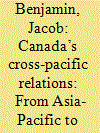

|
|
|
|
|
| Summary/Abstract |
This essay proposes a periodization of Canada’s cross-Pacific relations: from the Asia-Pacific era beginning in the 1980s to the Indo-Pacific era beginning around 2018. In the era of the Asia-Pacific, Canada was relatively disengaged on matters other than economic relations, as Ottawa sought to capitalize on dynamic emerging markets. Canada’s non-confrontational approach enabled a constructive relationship with China. The conditions for this functional relationship changed as Xi Jinping’s China assumed a more overtly revisionist, risk-taking, and confrontational foreign policy. In light of this, like-minded players in Asian security have adopted the “Indo-Pacific” nomenclature and concept in order to facilitate more interaction with each other and maintain maritime security. Midway through the Trudeau government’s tenure, the “Indo-Pacific” is likewise being adopted, as relations between China have soured while relations with other Asian partners are increasingly prioritized, notably in the security domain.
|
|
|
|
|
|
|
|
|
|
|
|
|
|
|
|
| 2 |
ID:
187383


|
|
|
|
|
| Summary/Abstract |
This article uses the Trudeau Government’s decision not to nominate General Jonathan Vance to the position of Chair of the Military Committee (CMC) as a basis to examine the extent to which states should fear alliance contributions. The authors examine if the decision could have been based on fears of expected yet “tacit” pressures to accept greater responsibilities and costs within the overall alliance framework. By analyzing “traditional” NATO alliance contribution data from 2002–2020 through six previous CMCs, this research examines whether incumbency in the CMC position is linked to an increase in material contributions to the alliance. The results of the analyses show that there is no direct relation between an alliance member holding the CMC position and increased alliance contributions. Nonetheless, this study contributes to the field of collective defence through an acknowledgement that states may not fear unstated alliance commitments and obligations as much as theoretically understood.
|
|
|
|
|
|
|
|
|
|
|
|
|
|
|
|
| 3 |
ID:
187382
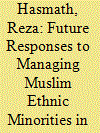

|
|
|
|
|
| Summary/Abstract |
Current policies to manage ethnic minority unrest in Xinjiang are not working, and do not address the core root causes behind ethnic tensions. Drawing upon lessons learned from global approaches to improving inter-ethnic relations, and factoring in China’s institutional behaviour and norms, this essay looks at policy responses that could be entertained by the state to improve the conditions of ethnic minorities in Xinjiang. It suggests that in the short-term (under a year) the state could be more responsible in using the big data it collects for targeted surveillance, in tandem with a community engagement approach. In the medium-term (one to three years), the state could employ practices to reduce ethnic prejudice by encouraging increased meaningful intergroup contact, and promoting a positive media portrayal of ethnic minorities. In the long-term (three years plus), improving the relative socioeconomic ethnic inequalities is paramount.
|
|
|
|
|
|
|
|
|
|
|
|
|
|
|
|
| 4 |
ID:
187385
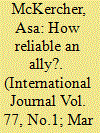

|
|
|
|
|
| Summary/Abstract |
The withdrawal of US forces from Afghanistan, and the subsequent collapse of the Western-backed Afghan government in August 2021, raised doubts in the United States and abroad about the limits and credibility of American power. For some observers, the situation seemed to parallel the fall of the South Vietnamese regime in April 1975. Given the comparisons being drawn between Saigon and Kabul, this brief paper examines a series of Canadian diplomatic reports produced in the wake of the events in South Vietnam. Addressing the question of how reliable the United States was as an ally, the conclusions drawn in these reports should give some pause to doomsaying about US security commitments. Although the contemporary situation differs from that of the mid-1970s, Canadian observers recognized that American power rested on a firm foundation.
|
|
|
|
|
|
|
|
|
|
|
|
|
|
|
|
| 5 |
ID:
187386
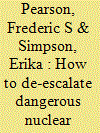

|
|
|
|
|
| Summary/Abstract |
Amidst the war in Ukraine, it is important to raise the prospect and vision of creating mutual security guarantees and ridding Europe of its dangerous nuclear weapon systems and provocative force deployments. In view of reckless Kremlin rhetoric and aggressive military action in Russia’s so-called near abroad, it is time for renewed approaches to arms control. As the Ukraine situation plays out, Russia, the United States, and allies in the North Atlantic Treaty Organization must return to their bargaining tables and negotiate strict limits, verification measures, and overarching controls over their nuclear use doctrines, weapon stockpiles, and conventional force deployments. All sides will have to make deep concessions and de-alert and de-operationalize mid- and short-range nuclear weapons while improving command and control safeguards—because, as we see, brandishing weapons and threatening escalation heightens tensions and increases the danger of crises spiralling uncontrollably.
|
|
|
|
|
|
|
|
|
|
|
|
|
|
|
|
| 6 |
ID:
187387


|
|
|
|
|
| Summary/Abstract |
Ukraine is existential to Russia, but peripheral to American interests. The “escalation dominance” advantage is with Moscow, and no amount of military aid or economic coercion, short of an actual war, will deter Moscow, given the asymmetry of interests and differing threat perceptions. American public opinion remains firmly opposed to risking a potential great power war. That said, a Ukraine—if it exists as a state after the war—at peace with its neighbours is in everyone’s interest, as is a decreased risk of a great power conflict. This policy brief identifies some confidence-building measures that might, in a similar situation in the future, result in a more realist grand bargain. A potential war might be a short punitive campaign by Russia, in which case the central thesis of this policy brief, a neutral zone in Ukraine, will remain intact. It might also be a war of occupation and conquest, in which case this paper might be considered a study in a counterfactual history of what could have been.
|
|
|
|
|
|
|
|
|
|
|
|
|
|
|
|
| 7 |
ID:
187380


|
|
|
|
|
| Summary/Abstract |
In the process of creating the policies and structures that led to the formal organization of Canada’s Defence Research Board after the end of the Second World War, senior military and defence officials in Ottawa conceptualized and established a scientific intelligence bureau within the defence department. Recognizing the heightened military significance of science during the war, defence officials believed that scientific intelligence—the practice of analyzing scientific information for forecasting the weapons and warfare potential of enemy countries—could support and improve Canada’s military preparedness efforts in the immediate postwar period. Using recently opened government and military records, this article explores the origins and history of Canadian scientific intelligence during the early Cold War, framing the topic as useful for understanding Canada’s military past and Ottawa’s approach to some of the country’s top security and defence issues of the late 1940s through the mid-1960s.
|
|
|
|
|
|
|
|
|
|
|
|
|
|
|
|
| 8 |
ID:
187381
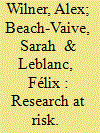

|
|
|
|
|
| Summary/Abstract |
Although traditionally viewed as paragons of international cooperation, research institutions and universities are becoming venues for hostile foreign activity. Research security (RS) refers to the measures that protect the inputs, processes, and products that are part of scientific research, inquiry, and discovery. While RS traces its roots to the 1940s, global economic and research and development competition, the nexus between dual-use technology and military power, a cluster of newly emerging industries, scientific responses to the COVID-19 pandemic, and societal shifts towards digitization, combine to challenge RS in unique ways. With an eye on safeguarding traditional notions of open science, our article refurbishes Canadian RS within the context of emerging challenges and international responses. Detailing the legal, extralegal, illegal, and other ways in which RS is threatened, we use a comparative assessment of emerging responses in the US, Australia, Japan, and Israel to draw lessons for Canada.
|
|
|
|
|
|
|
|
|
|
|
|
|
|
|
|
|
|
|
|
|